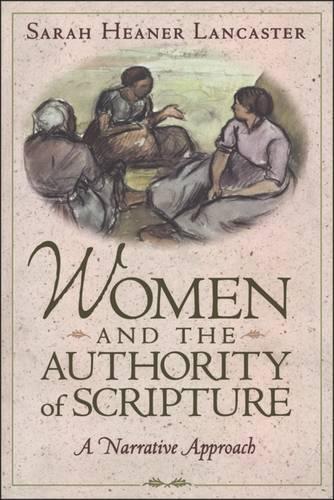
Women and the Authority of Scripture: A Narrative Approach
(Paperback)
Publishing Details
Women and the Authority of Scripture: A Narrative Approach
By (Author) Professor Sarah Heaner Lancaster
Continuum International Publishing Group Ltd.
Continuum International Publishing Group - Trinity
1st September 2002
United Kingdom
Classifications
General
Non Fiction
Criticism and exegesis of sacred texts
Gender studies: women and girls
220.6
Physical Properties
Paperback
208
340g
Description
The theological impact of accepting the absolute authority of biblical scripture is enormous - especially for women who attend and serve churches. But until now, few books have been willing to address this issue head on. Sarah Lancaster looks at the way women in the church have dealt with the question of scriptural authority and how they can address it in the future. Some women, she says, accept the authority of the Bible without question and stay in church without change of attitude or action. Others deny that the Bible has any authority, completely leaving Christianity in the belief that the Bible and Christian tradition are irredeemably patriarchal. Still others recognize that while scripture is largely partiarchal, it is authoritative for their life of faith. The Bible possesses a narrative coherence, its story resonating in our own lives. For women, the Bible can continue to "ring true" to their experience, letting them acknowledge scripture's authority in spite of its problems. The Bible is not about patriarchy; it is about how God is present to us and interacts with us in order to bring us to fullness of life. Lancaster says that women can criticize those things in scrupture that help maintain a patriarchal world without invalidating scripture's authority. Scripture, she argues, informs, forms and transforms. With its combination of narrative and feminist theology, "Women and the Authority of Scripture" brings a powerful new perspective to the doctrine of biblical authority in the contemporary world.
Reviews
"With its roots in experience, and particularly in the experience of women, this clear and perceptive treatment of the authority of scripture combines descriptive power and constructive promise. Sarah Lancaster has drawn upon a broad range of resources to explain how the biblical writings actually may function to foster a knowledge of God, and she goes on to develop a relational account of biblical authority that does not do violence to the text, the reader, or the community. This book has much to offer to contemporary theological reflection and to the life of the church." --Charles M. Wood, Perkins School of Theology, Southern Methodist University -- Charles M. Wood * Blurb from reviewer *
"Many people have been waiting for this book! Offering a thoroughly feminist and relational view of scripture, Sarah Heaner Lancaster presents a large view of the Bible, positioned within historical debates and contextual concerns. Her work is well researched, respectful of diverse views, and lively in presentation. Drawing especially on sources from Christian feminism and Protestant orthodoxy, Lancaster offers a relational view of biblical revelation and authority, and proposes a narrative approach to reading the Bible. This book will be an invaluable resource for theological classrooms and theologically-eager congregations." --Mary Elizabeth Moore, Professor of Religion and Education and Director of Women in Theology and Ministry, Candler School of Theology, Emory University -- Mary Elizabeth Moore * Blurb from reviewer *
In this engaging and well-written book, Lancanster provides a nuanced, accessible, dialogical model of authority for Christian feminists. Her model affirms the authority of women to be biblical interpreters and to uncover and resist the harm done to women in the name of biblical interpretation while at the same time recognizing that the Bible itself has authority as it offers to Christians the "saving knowledge of God." By presenting authority as multi-dimensional, contextual and social, Lancaster urges us to reflect critically on the multiple forms authority takes in our lives (both positively and negatively) rather than pitting the authority of women over against the authority of the biblical text. -- Pamela Dickey Young * Blurb from reviewer *
"In this perceptive work, Sarah Heaner Lancaster struggles with one of the nastiest knots confronting Christian women today: the issue of biblical authority. While some feninists completely reject the Bible as a source of spiritual guidance and truth, others labor to reconcile the centrality of the Bible in Christianity with their own experiences of oppression in biblically oriented communities. Can the fundamental commitments of feminist theology be made to fit with an equally fundamental commitment to the Bible as word of God (17) Her answer is yes, given thoughtful and creative understandings of the nature of biblical revelation and biblical authority...She demonstrates a broad expertise in theology and theory and integrates several complex Christian categories with sophistication and grace. Most important, she offers a valid, creative, woman-friendly understanding of biblical authority that this feminist reader finds compelling."--Betsy J. Bauman-Martin, Review of Biblical Literature, March 2003 -- Betsy J. Bauman-Martin * Blurb from reviewer *
"Her feminist approach grounded in the thinking of postmodern authors such as Mary McClintok Fulkerson and Kathryn Tanner, enables her to retain the orthodox understanding os Scripture as revelation while at the same time assume feninist authority to cahllenge any patriarchal biases...it is a clear presentation of the matter for those for whom the struggle is current."--Dianne Bergant, C.S.A., for The Bible Today, May/June 2003 -- Dianne Bergant, C.S.A. * Blurb from reviewer *
"Lancaster presents an engaging argument for a re-vision of the Protestant understanding of the authority of scripture and its consequence for women readers...an excellent resource for feminist theologians and seminary students."--Religious Studies Review, Volume 29, Number 4, October 2003. -- Jacqueline Grey * Blurb from reviewer *
Author Bio
Sarah Heaner Lancaster is Associate Professor of Theology, Methodist Theological School in Delaware, Ohio. She is an ordained elder in the North Texas Conference of the United Methodist Church. She lives in Westerville, Ohio.
